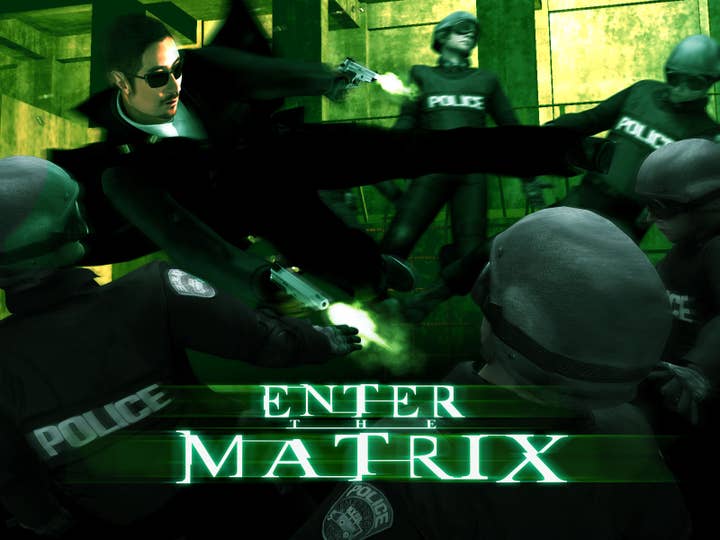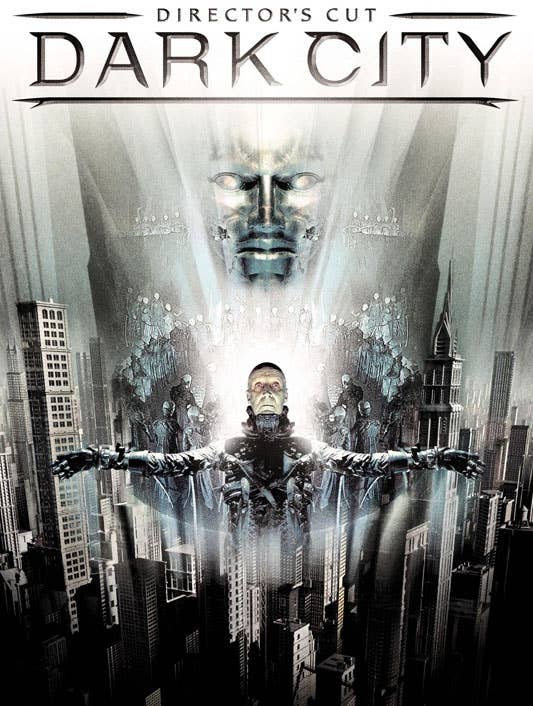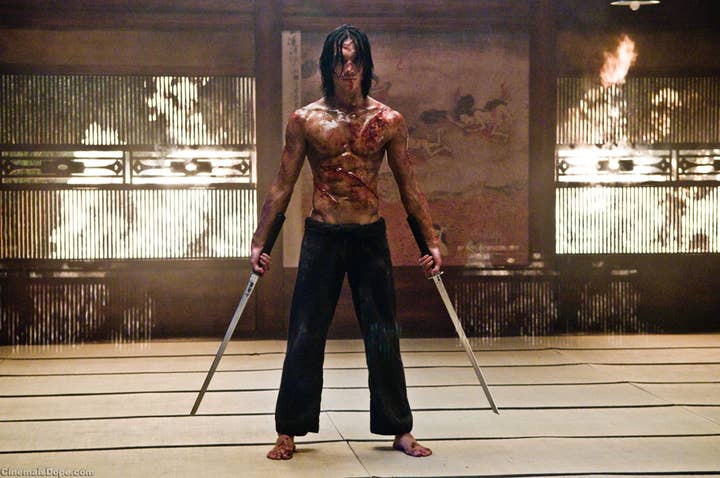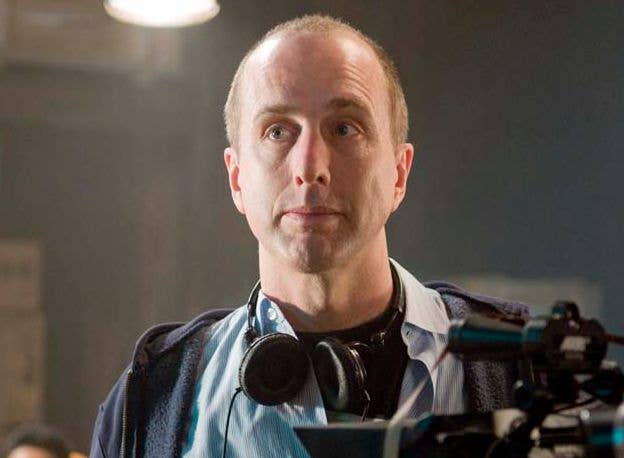Games need more direction, says filmmaker James McTeigue
The V for Vendetta director says there has to be a "master of the ship" on a game at some point so that designers don't get bogged down in minutiae
The intersection of games and movies has a long history with few successes to point to. Interest in crossing the two different media has been heating up, with director JJ Abrams addressing the DICE summit on the issue earlier this year. Transmedia projects like Hawken and Defiance are exploring new connections between games and other media. New movies and TV shows based on game properties continue to be initiated.
James McTeigue is a Hollywood veteran who's worked on many game-related projects. He directed V for Vendetta in 2005, which created a huge cult following and spawned the cultural meme of the Guy Fawkes mask used by Anonymous and other protestors. McTeigue has worked on many genre films as second unit director or assistant director, including The Matrix series, Star Wars Episode II, Dark City, Ninja Assassin and Street Fighter, to name a few. His experience with the game industry has been a long one, including filming segments used in the Enter the Matrix game.
At the [a]list summit in San Francisco last month, veteran director James McTeigue addressed the audience of game industry execs about the crossover between the two media. Afterward, he sat down with GamesIndustry International for this exclusive interview.
I think it's possible to change it. There's a real value in Hollywood to understanding the essence of what makes a particular game or brand successful. In a lot of ways, Hollywood tries to foist their ideas and structures and strictures onto the gaming community in their effort to make a movie out of it. I think it hasn't been successful because the gaming community at the moment just goes "Well, it's Hollywood, and they're going to make a poor effort over the game; why should we believe they're going to do anything good with it?"
Alan Moore, who was the original writer of V for Vendetta, he'd sold a bunch of his graphic novels to Hollywood and they'd made a bunch of terrible movies. He hated it, he really hated it. When I got to talk to him about V for Vendetta, he goes "Look, everything I've given Hollywood so far they've wrecked, and why would I believe you'd do anything better with it? They've got Watchmen in the works, and why would they do anything better with that?" I think it's just about finding the right person and the right studio, in this case, to do something that's credible to the gaming community for a particular game or brand. I don't think it's completely lost.
There's a way to do it properly. At the moment - and I'll just use Call of Duty because it's like the most popular game ever - there's no point in trying to make a movie of Call of Duty. Just making one movie, that doesn't make sense. There are too many iterations of the game itself for there to be just one film. If you're making Lord of the Rings, you're attacking all the books. If you're doing Hunger Games, or if you're doing the Twilight series, you're treating each book like a movie. There's probably a lesson to be learned in that. Most games now have lots of iterations, whether it's Assassin's Creed or Call of Duty.
The way I would approach it is do a ground zero approach. Treat it like a book; why not make a movie where the game started? What was interesting in that first game that became a property that everyone loved and spawned a sequel in the gaming community? You don't have to pick it up and make a movie on the fourth iteration of Assassin's Creed. Take the original and make a movie like that. I think that's how it could work successfully.
"There is a certain opportunism, too, which is kind of naked in Hollywood a little bit, where they try to - 'OK, this film's successful, now we're going to try and do a game' and that never, ever, ever works"
James McTeigue
It would absolutely help. I think that's what the sequels of The Matrix tried to do. They tried to bring that whole transmedia bubble together in the first cohesive way - a movie, and a game, and anime, and comic books - and I think that was successful. The only problem was there was not enough lead time on the game, so the game wasn't right by everyone's definition, and I'll say the game wasn't very good. But that is just like you were saying; the R&D development process. You can start a film 18 months to a year out. You need to start a game two to three years out, easily.
I think it would. You're right; they're two totally different experiences. Games are interactive, films are passive. At the moment, for the most part, you sit in a darkened cinema and watch it. You can't capture the essence of the storytelling and what the game is about. You could do it with Grand Theft Auto, if you wanted to. That game can be one of the most cathartic experiences you ever had, because all you do is destroy. I'm sure there's a movie version that is not just out-and-out thuggery and killing.
Yeah, I think that sort of bridges the gap. If you're from the gaming community and go and see a film of the game that you really love, part of that has to be an acceptance by you, the gamer, that it's not going to be the game.
Correct. If I want to have a steak I don't go to a fish restaurant. Films are all about expectation. My expectation is that I'm going to see a serial killer movie, and for two hours that's the world I'm going to be involved in. Or I'm going to see Avatar and I'm going to be involved in this fantastical world. I just don't think you can go to a film of the game and go "This needs to be the game." But if you can grab onto the kernel of what makes that game interesting to you, and it's in there in the film, then I think you can have a good experience. It just hasn't happened yet. I think there is a certain opportunism, too, which is kind of naked in Hollywood a little bit, where they try to - "OK, this film's successful, now we're going to try and do a game" and that never, ever, ever works.
"You absolutely know that you will not please all of the people all of the time"
James McTeigue
It's an interesting idea. It's kind of what a game like Heavy Rain tries to do; it tries to get you involved in the decision making. You're right; the ride from being completely involved in the game, to all of a sudden going from ten to zero because now I'm this passive participant and they're showing me some footage and I can't do anything. You know what I want to do? I want to get past this. I just want to get back to doing what I was doing. It frustrates you even more, even though the person who's making the game wants to give a richer, much more immersive experience. What it's actually doing is hold you at an arm's length.
That happens more in games than it usually does in movies - unless the movie's really bad - because of those gear changes, like you're saying, because all of a sudden you're stopping. I think that's why games where you have to do less of that are sometimes much more successful. It depends on what you want to get out of your game, too; it's a total personal thing. If what you want is cutscenes all the time you can play game B; if you like to just hit things and kill things go play game A.

You're right, there has to be a master of the ship at some point. The master of the ship has to guide you like you do in a film or like you do in a game, so that what I'm going to expose you to is worthwhile. Like anyone who's been in the gaming industry, you absolutely know that you will not please all of the people all of the time. It's like politics in this country - it's complete polarization. "This is the best game I've ever played... This is the worst game I've ever played." Before it used to be "Hey, there's some good things about this..." No. Now it's just "This is terrible."
The reason I bring that up is that I think as the maker of the game you ultimately have to decide for the gamer a little bit. You can't cover every option, you can't make the interior of every store, because what's the point if you have ten million people playing the game and only two want to go inside the shop? It doesn't make any sense. Just guide 'em; it doesn't mean that you can't do it sometimes, but make it worthwhile, make it integral to the story, make it part of the thing that you need to do. Just don't get bogged down in the minutiae of that, hoping that someone will go in there sometime.
The other thing I would compare that to is when you make a film, you shoot the film and there are certain scenes when you're making the film that you know you'll never use. But you know part of the process is you have to make those to make sense of what you're doing at the time. Then they just end up in the DVD or something like that. The parallel I would use with a game is sure, do it for yourself. It doesn't all have to be in the game. You don't have to get bogged down in that and spend a year longer making the game.
The game version of the test audience in film is like the beta version, right? What it seems to be sometimes happens in games is they listen to the noise too much. The only thing that I really do in the test-screening process...is trends. If enough people say "I hate your lead actor" then it's time to get rid of the lead actor; it's time to take him out of the movie (I'm using the extreme example). If you have a test screening, and you have a focus group after, and 19 out of 20 people in the focus group object to something, then you look at it. "Wow, I've been too involved in this, I haven't seen that." If you have two people going "The girl who appears in the third act, she has these red shoes and I hate red shoes," who cares?
Probably what happens in the game process and some films is people don't look for trends. They look for too many isolated things that don't really matter that much to what the end product is. If you're concentrating on the story, and people can follow the story from A to B, then they'll forgive you a lot of other stuff. But if they can't follow the story, or they can't keep up with the game, then you're in hot water and people are looking for things.

A good example is Life of Pi. There is some of the greatest immersive filmmaking that I've seen for a while, but has some of the worst acting I've seen in my life. The worst acting is two people sitting at a table; it's the writer talking to the reporter, and the reporter is atrocious. I'm like, "Wow, look at all this amazing stuff over here, how come this guy's so bad?" Sometimes you just miss that stuff. My point is people will totally forgive that bad acting because there's this other whole universe over here, and the story flows along.
That takes you from five stars to one star. The impression you walk out the door with is the thing you remember. It can be you get so involved with [your project] that you can't see the forest for the trees. But I think it's your job as director, as the person who's developing the game, to be able to see that. That's why you're there, but every now and then you need to step outside of yourself and hear other people's opinions. But then it's also your job to filter that and work out what is right and what is wrong, and what works and what doesn't work.
"What happens in the game process and some films is people don't look for trends. They look for too many isolated things that don't really matter that much to what the end product is"
James McTeigue
They want the story, and they don't care if the approach is lo-fi. If you have a kid in his bedroom and he's on five devices and you need to keep his attention, the story's the thing that will keep his attention. It won't be whether the fog effect is fantastic or whatever it is. It'll be the thing that involves him in the game itself. People are even more and more forgiving. I think that's why in film, digital technology has made such an inroad, because film, that's my generation, it's the generation before me, maybe it's the generation after me. Now, it's completely freed up; you can do anything. It's a generational change. Kids who go and see film now, they don't care if you're shooting on film. As long as it looks OK and the story is OK, then it's OK. A lot of that change is completely generational.
It's almost like people don't like being lied to. This film came out recently, is was called Jack the Giant Killer and then they called it Jack the Giant Slayer. I think the effects were cheesy, and the story wasn't good... You've gotta get one of those things right. You've gotta have a good story and cheesy effects, or the most amazing effects and at least make sure your story is OK. You have to be more careful than ever. It's the narrative that people are interested in.
Yeah, I think so because there are too many smart people making them. The creative level within the gaming community is huge. Films were the great art form of the last century. Games are still young; if you go back to Atari that wasn't so long ago. Going forward, if games have had the benefit of another fifty or sixty years they would be amazing. That's what happened with film. It just got better and better. It started off with Edison, and then you had the silent films, and then the talkies, and then color... The craft just got honed and honed.

I know you're drawing a parallel to games; they're always trying to smash the glass ceiling every time they make a new one. I think that's true but I think that's probably going to reach critical mass at some point. They'll go "This is what we've got; we can keep refining that, but the main tenets of what we've got are here and this is what we're going to use." There'll always be benchmarks, and epochal kind of games, in the same way you had a 2001, or The Matrix, or Avatar. The reason I bring those three up is they changed the way people viewed films.
I think you have that in the gaming community, too. With the benefit of time it will get better, with the way stories are told, the way stories are interwoven into the gameplay will get better. I think they'll become more seamless. There are too many smart people in them, and as the craft of it gets better, as there are more people doing it over and over again, then they''ll take that expertise and apply it to the next thing. Like you were saying, all of a sudden the director said "Instead of one camera, I can have three, and if I have three I can move that one and have these two cameras picking that up." I think a version of that will happen in games; it's already happening.
Like you were saying, the Kickstarter games are a good example. At the point where Activision or someone goes "We just spent $300 million rolling that game out the door" or whatever that figure is, but another game came behind them, spent $20 million and got an incredible response to it, then they'll be more of that. It works the same way film works; sure we can spend $350 million making Avatar, but we can also have this really cool lo-fi movie called Chronicle.
Then it changes the mindset of the studio. That's what will happen in games. You need those things that change the mindset of the way things happen. I think that's happening; that's a really good point with the Kickstarter games.
I think so. In games, like in films, the first sequel will always do better than the original; that's always the way it happens. But then as it gets dragged out and dragged out, it's hard to maintain the brand. It starts to get diluted. It's like the guy who opens a great restaurant. He goes, "Oh my God, I've got a great restaurant; now I'm going to open this restaurant over here." All of a sudden, his focus is shifted; he's torn between two places. That happens in films, it happens in games, and you have to be really true to why people liked your product in the first place.
They want to keep feeding the machine, they want to recoup. You're right, but it can also be the thing that kills you, too, because you dilute the brand. When you dilute the brand, or you dilute the essence of what drew people to it in the first place, then they'll just move on. People are ruthless like that.
Take the last Harry Potter movie; they had no intention to make that two movies. They just got in there and said, "Wow, we can make two movies out of this and make twice the money." What's not to like?
If people liked your first iteration of your game, you don't have to make it so much more different on a graphic level for them to like it again. Just make sure the narrative and the content is good. If you build it, they will come.

